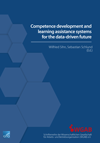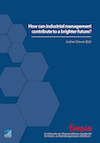Search


Bibtex
Cite as text
@Article{,
Year= "2021",
Volume= "Schriftenreihe der Wissenschaftlichen Gesellschaft für Arbeits- und Betriebsorganisation (WGAB) e.V.",
Pages= "261-278",
Journal = "WGAB",
Title= "Analysis of supply-chains in the circular economy by means of VSM ",
Author= "Jeff Mangers
Manufacturing Engineering University of Luxembourg
Prof. Dr.-Ing. Peter Plapper
Manufacturing Engineering University of Luxembourg
",
Doi= "https://doi.org/10.30844/wgab_2021_16",
Abstract= "The Circular Economy (CE) concept aims to close resource loops and keep resources in the system for as long as possible at the highest utility level, without neglecting the goals of sustainable development. This paradigm shift from a finite and linear to a circular economy is however only possible if systems can be viewed as holistic overall systems. Thus, preventive problems can be identified and located as early as possible and counteracting measures initiated.
This paper presents a new value stream mapping (VSM) model to consider interrelated processes in a holistic manner, regarding the requirements of CE. To do so, one macro-level to consider interrelated company relationships together with a respective micro-level to consider the individual company specific processes are elaborated. The degree of circularity is determined based on the 9R framework and new visualizations and measurement indicators are added at the different levels. This new model helps to mainly identify hurdles at a product's end-of-life, which are preventing a circular flow of resources, worth sharing with the responsible of a product's beginning-of-life. The model itself is validated by an extensive cross-company PET-bottle case study in Luxembourg.",
}
Jeff Mangers
Manufacturing Engineering University of Luxembourg
Prof. Dr.-Ing. Peter Plapper
Manufacturing Engineering University of Luxembourg(2021): Analysis of supply-chains in the circular economy by means of VSM . Schriftenreihe der Wissenschaftlichen Gesellschaft für Arbeits- und Betriebsorganisation (WGAB) e.V.(2021), S. 261-278. Online: https://doi.org/10.30844/wgab_2021_16 (Abgerufen 24.02.26)
Open Access
Abstract
Abstract
The Circular Economy (CE) concept aims to close resource loops and keep resources in the system for as long as possible at the highest utility level, without neglecting the goals of sustainable development. This paradigm shift from a finite and linear to a circular economy is however only possible if systems can be viewed as holistic overall systems. Thus, preventive problems can be identified and located as early as possible and counteracting measures initiated. This paper presents a new value stream mapping (VSM) model to consider interrelated processes in a holistic manner, regarding the requirements of CE. To do so, one macro-level to consider interrelated company relationships together with a respective micro-level to consider the individual company specific processes are elaborated. The degree of circularity is determined based on the 9R framework and new visualizations and measurement indicators are added at the different levels. This new model helps to mainly identify hurdles at a product's end-of-life, which are preventing a circular flow of resources, worth sharing with the responsible of a product's beginning-of-life. The model itself is validated by an extensive cross-company PET-bottle case study in Luxembourg.
Keywords
Schlüsselwörter
References
Referenzen
.

 Deutsch
Deutsch
